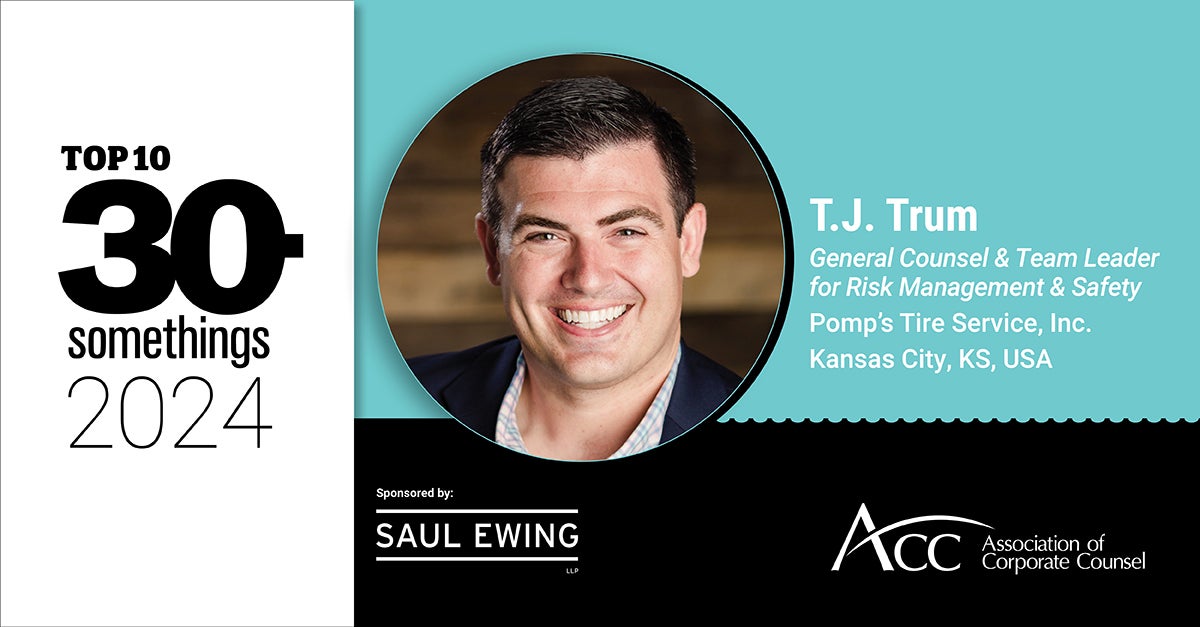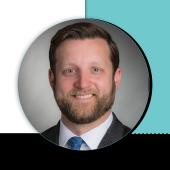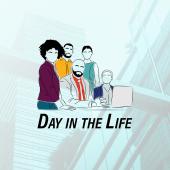The ACC Top 10 30-Somethings awards recognize in-house counsel between the ages of 30 and 39 for their innovation, approach to challenges, well-rounded perspectives, contributions to the in-house community, and pro bono and volunteer work.

When an in-house counsel truly loves his or her industry, it can open up a world of opportunities. That’s especially the case for T.J. Trum and the company that hadn’t had an in-house counsel before him.
T.J. describes starting out as a “Michelin tire baby,” by growing up with a father who eventually owned an independent tire dealership, and later spending his summers washing trucks or running commercial truck tires to roadside service technicians. His first job out of law school, however, was defending community banks for a law firm before rolling back into the tire industry.
“Working for a small-to-medium sized family business, there simply wasn't an option for just being the in-house lawyer,” so he therefore ran regional operations — managing tire centers and a retread manufacturing facility — as well as becoming their in-house lawyer.
“You wake up one day and all of a sudden you're in steel-toed boots and a pair of dusty blue jeans instead of meeting with clients that wear a suit-and-tie every day,” T.J. notes.
When the business was acquired by Pomp’s, T.J. helped turn the M&A into a personal connection by leveraging his hands on experience in the business operations with his legal training. I am so grateful that the team at Pomp’s had the faith and confidence to give me the opportunity to prove myself. Every day I strive to earn and maintain that trust.”
Starting at the bottom turned T.J. into an expert in many ways most in-house lawyers never experience but that helps him every day in knowing how employees, like technicians and truckers, think and feel. One example is when he first started out in the industry summers during high school by washing roadkill off trucks with a trucker looking over his shoulder. “It’s his baby,” says T.J. of the vehicle trucking thousands of miles. “And it gives you an appreciation for the grit and grind and an honest day's work.”
Keeping his eyes on the road
“The most wonderful thing about being in-house is that I can take problems and not only manage to mitigate them, but also penetrate deeper into the root cause of how we got into that situation in the first place, and work with my team and our company to make sure it doesn't happen again,” he says.
So when tasked with stopping a long run of critical safety issues, he had a good sense of how to keep Pomp’s moving ahead. “Whereas every fiber of legal training screamed to start with strength (document, document, document),” he noted, he developed a unique strategy: public relations, advertising, and training.
He chose to inspire a new team of industry safety professionals toward changing the culture to more safety-conscious practices. He built relationships and, “Once the culture was improving, then the policies and documentation weren't simply aspirational words on a wall,” he says.
"The most wonderful thing about being in-house is that I can take problems and not only manage to mitigate them, but also penetrate deeper into the root cause of how we got into that situation in the first place, and work with my team and our company to make sure it doesn't happen again."
T.J. Trum
In the first year, fewer than 50 percent of teammates had industry standard training; by the end of the next year 100 percent met or exceeded industry standards.
Pomp's, says T.J., appreciates and understands how pivotal industry standards – such as Standard 1910.177 – are in the tire business. To better understand the industry, T.J. joined the Tire Industry Association (TIA), where he’s an active board member, and can learn from others and contribute back to the industry at large.
To comply with the US Occupational Safety and Health Administration (OSHA) industry safety standards, T.J. developed eight "Spokes of Safety” core values. Going beyond training and written manuals, T.J. knew that a distracted driving ad campaign, with powerful, emotional videos, could engage his target audience to change behaviors and drive more safely.
“You need to build a meaningful connection with your audience,” he explains. “If I’m going to inspire change, then I need to connect on a deeper, more personal level.”
Beyond his responsibilities
“One of the benefits of being in-house is you don't have to wait for something to happen,” says T.J. “You can truly be the proactive leader who identifies areas in your organization you want to improve.”
Figuring out the reasons for issues and going beyond the typical responsibilities in contracts and litigation, expands the in-house role and benefits the profession and the client, T.J. adds.
He also answers a calling to prevent human trafficking, a plight he says many don’t realize is happening in the United States, through Trucker's Against Trafficking, partly by implementing education at Pomp’s, a partnership with TIA, and co-branded logos on trucks.
Wisdom for new in-house counsel
“Learn as much as you can about your business,” advises T.J. “And I don't mean from your office in the corporate building, I mean laced up boots on the ground. Know how it operates.
“Whether you're reviewing a contract or creating a policy, that intimate knowledge of the world and the teammates that it’s for, who you're creating those contracts for, and those policies for, is vitally important.”







